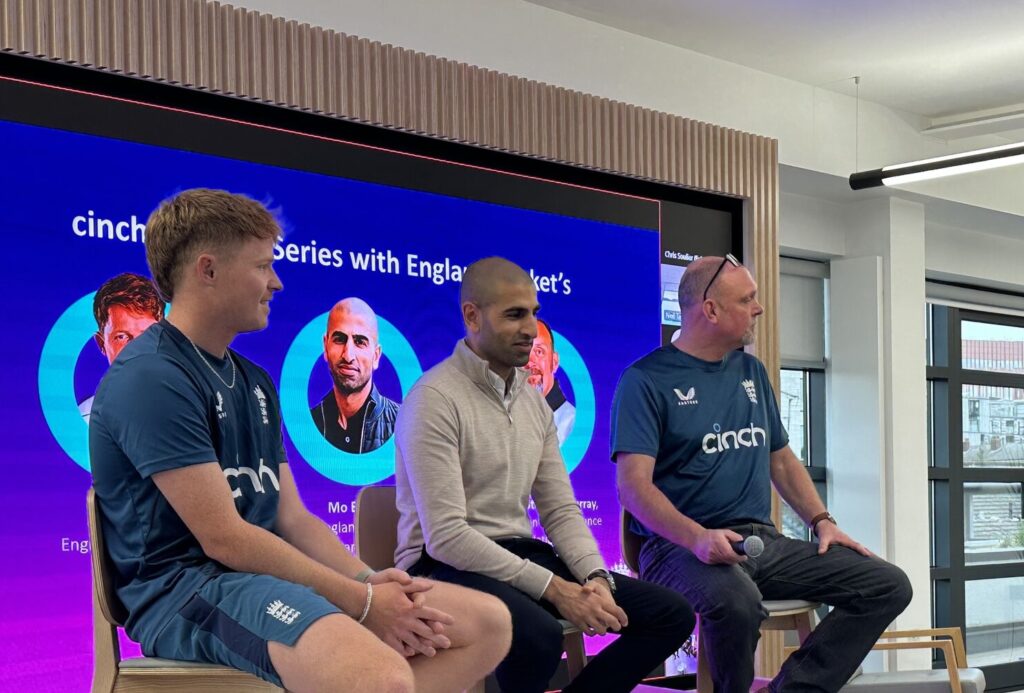How Cricket Continues To Embrace Innovation To Remain Progressive
November 20, 2023
In the week’s Member Insight piece, David Granger, content director at Cinch spotlights on how a sport that prides itself on tradition, cricket is making great strides to remain relevant and encourage new audiences.
Cricket has had a minor renaissance over the last 12 months – in England especially. Fueled by national coach Brendan McCullum’s reinvention of how the five-day Test series is attacked – literally – and the announcement that one of the oldest sports will now be a part of the Olympics in Los Angeles in 2028 after an absence of a mere 128 years.
(It hasn’t been all good news in 2023, with England’s unexpected early exit from the World Cup, but let’s concentrate on the good stuff.)
For a game which prides itself on tradition and history – it has also undergone a technical, and with it, marketing, evolution. Cricket, a game which is steeped in lore, is conversely, one of the most progressive of sports. Take a look at the ECB TikTok feed and this is not the work of the old establishment. This is cultural references, meme-jumping and promotion of athletes as real characters. It’s not inventing new formats to bring in new spectators, it’s going to where that next generation audience is consuming content.
This will be necessity as much as shrewd promotional nous. As sports with lesser history or tradition barge on to screens and into stadia with a brashness which just isn’t cricket, cricket itself needs to, if not reinvent, then retain relevance. While the game maintains an appeal others can only dream of in India, and takes on the main players in the US, the sport finds itself competing with everything from a resurgent F1 to esports, pickleball and padel.
As ever, the need to balance information and entertainment is key. Too much of the former on digital and social and you alienate new fans and duplicate other platforms. Too much of the latter (hello Drive to Survive, howdy Las Vegas!) and the narrative becomes solely about mass appeal with little interest for the casual fan and no insight for the fanatic.
What cricket has done, and the ECB especially with its Ashes, Two Ashes campaign (genius tagline) over the last 18 months has maintained its core appeal while modernising its output. Take its own inhouse documentaries available not on streaming or via subscription but on its website for no charge: check out Red Ball Revolution and the Ashes That Caught Fire on ecb.co.uk. This is great narrative content which can entertain both the newcomer and the ardent spectator. Another innovations is free-to-view highlights of the Ashes tests as they took place. While others are putting up paywalls and fighting illegal streaming, the ECB was providing highlight after highlight as the days, innings and matches progressed. Another way of keeping fans up to speed, while ensuring they were signed in and on the mailing list and doing it digitally. Traditional sporting action delivered for a 2023 audience.
But then cricket has always managed to embrace technology. Hawk-Eye was first used at a cricket match, a Test game between England and Pakistan in May 2001. And anyone who has ever had to play, watch or score (especially score) a match will know cricket has always been obsessed by data. Any entity which had the Duckworth–Lewis–Stern method devised by mathematicians and statisticians to work out who won is clearly happy with the numbers side of sport.
This embracing of the data side of sport has manifested itself in the England team set-up. At a recent event in London, discussing the importance and merits of data in both the online and on-field arenas, were Mohammad Bobat the ECB’s Men’s Performance Director, Prof Staff Murray, ECB Head of Analysis and Insights, and England vice-captain, right-handed batter, and occasional wicketkeeper, Ollie Pope.
The conversation covered the use of data and analytics in helping to choose the team, assisting players with their performance, tactics during matches, scouting the next generation of England internationals.
English cricket has, like many sports, embraced insights to assist its coaches and players, but as Bobat said, data is a tool which allows better questions to be asked and calls to be made. He said: “I’m not that interested in data, I am interested in decision-making – I have the philosophy of data on tap, not data on top.”
And that’s the balance the ECB has achieved this year: understanding how innovation and technology can support its spectators and fans and encourage new ones without antagonising the (some might say occasionally conservative) old guard.
You can reach out to David here.


